16 fantastic artificial intelligence tools
ChatGPT, a text bot from the OpenAI company, has been leading the race to popularize artificial intelligence (AI) tools. Launched at the end of 2022, in just two months the smart chat reached the expressive mark of 100 million users. However, although ChatGPT is the best-known Artificial Intelligence, it is not the only one available in the market, with several competitors being launched each month.
There are several artificial intelligence tools and the best known are ChatGPT, Dall-E, and Midjourney. However, there are others that allow you to do really cool things, such as changing your face, helping with drawings, or editing videos.
In this article, you will learn about the top Artificial Intelligence tools that have been released recently and give you an overview of what can be done with this technology.
1. ChatGPT
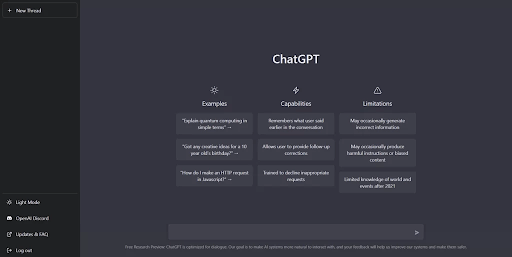
It’s hard to talk about AI without mentioning ChatGPT and we love the tool here at Apptuts so much that we even wrote this article about ways to earn money with ChatGPT. The tool was developed by the company OpenAI, which received investments from technology industry giants, including Microsoft and Elon Musk himself, one of the richest men in the world.
The tool is an autonomous chatbot, capable of performing advanced tasks such as:
- Answer complex questions;
- Organize, collect, and provide accurate information;
- Create creative content, such as jokes or stories;
- Translate content into several languages;
- Write programming codes.
2. Dall-E
Dall-E fits into the category of software that will change the art world forever. Also developed by OpenAI, Dall-E is a neural language model that creates images from descriptions.
For example, by typing “draw a picture of an astronaut riding a horse”, the AI created the following image:

The possibilities with Dall-E and other image-based AI software are huge, and they are already changing the digital art market.
3. AutoDraw
Next up in our list of the best artificial intelligence tools is AutoDraw, which is an AI developed by the giant Google. The software is capable of transforming doodles made with the mouse into great illustrative drawings. Watch the demonstration of the tool in this video from Google:
4. FaceApp
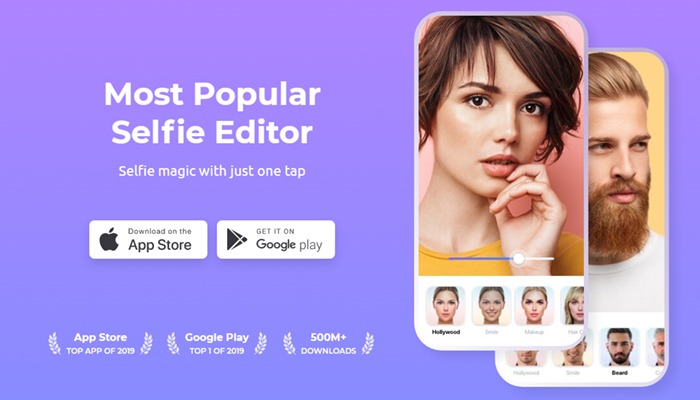
FaceApp has become extremely popular in recent years (we even have an article on FaceApp alternatives) due to its wide range of video and image editing features. With this app, users can perform various modifications to their selfies, such as changing their gender, hairstyle, beard, and even their smile.
What makes the app so impressive is the variety of options available, which catch users’ attention and encourage them to try different transformations on their photos. It is this combination of impressive features that have made FaceApp viral and so popular.
5. ClipChamp
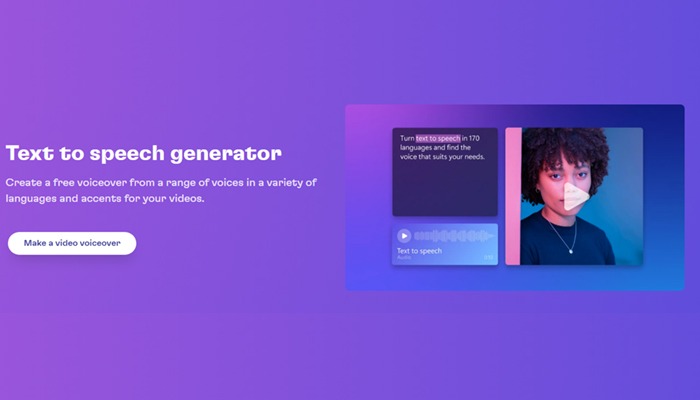
ClipChamp is a very powerful AI-based tool for content producers and media companies. The software is capable of generating realistic audio with more than 400 different voices in 170 languages based only on the text provided by the user.
Now it’s much easier to create that beautiful institutional video for your company or content for a YouTube channel.
6. Vall-E

Vall-E is a voice-based AI tool. But unlike ClipChamp, the AI is capable of generating fake audio from any voice. And the most impressive thing is that the software only needs 3 seconds of a voice to produce realistic audio.
The software is not yet available to the public, only a demonstration on GitHub has been released, as the technology will certainly have major implications for the world, especially for the dubbing market and criminal investigations.
7. Magic Eraser

Who hasn’t ever wanted to erase a detail in a photo? Or even remove someone or some object from an image? That’s exactly what Magic Eraser was created for. The tool allows entire objects to be easily removed from images with just a few clicks.
Without the tool, it would be necessary to use professional software like Photoshop to complete the task. Still, it would take a lot longer and probably have an inferior result.
8. Grammarly

Grammarly is an Artificial Intelligence software that specializes in correcting grammatical errors. Unlike conventional spell checkers, this AI is able to find errors that are subtle and go unnoticed by other software.
At first, Grammarly was developed to correct texts in English, but soon it will also work in other languages. The platform also offers advanced support for more complex textual constructions, which is why it is one of the best artificial intelligence tools.
9. FakeApp

FakeApp is an application that, despite its name, is currently only available on the desktop. The AI is capable of generating “deepfake” videos with just a few clicks. A deepfake is a montage of video, image, or audio modified by AI to appear real.
FakeApp’s differential is the possibility of making video edits in a simple way with the tool. It is possible, for example, to put your face in a scene from a famous movie, something fun and attention-grabbing.
10. Legal Robot

Closing our list of artificial intelligence tools is Legal Robot, which aims to revolutionize the legal market. The tool is able to analyze contracts and legal agreements. The AI simplifies the formal language of contracts and provides insights into the submitted text.
Plus, with this AI, you’ll have access to legal graph data so you can explore what’s on the market with the largest public source of contracts. As a result, you can have a preview of your contract negotiations.
What are the main uses of artificial intelligence?
Artificial intelligence technology is still in the development stage at most major tech companies. However, its applications are already changing a number of sectors and professional segments around the world.
Among the markets most impacted by technology are:
Chatbots and personal assistants
AI-based chats are certainly here to stay. Not only text chats, but voice chats should also evolve a lot with this leap that is being observed in technology.
Search engines
Search engines like Google should be affected by tools like ChatGPT. This is because the bot is able to provide accurate answers to questions. Bing, Microsoft’s search engine, is already integrating ChatGPT’s technology in a $10 billion deal with OpenAI.
Audiovisual sector
Setor audiovisual
The audiovisual market will be largely affected by AIs. With new technologies being able to generate and modify images, videos, and audio, the content production industry, cinema, dubbing, animation, and digital arts will be strongly affected.
Data analysis
AIs have proven to be a strong tool for data analysis for various sectors such as medical, legal, and economic analysis.
Which professional field will be most impacted by the use of artificial intelligence?
Although there are many uses for artificial intelligence and many tools have already been created to help in different professional sectors. Marketing is one of the main fields where this technology has been widely applied. Among the main uses of AI in the industry are content personalization, data analysis, optimization of advertising campaigns, and predictive marketing.
With so many AI-powered marketing tools out there, it’s important to choose the ones that best fit your business needs and your budget. Therefore, we will now present the 6 best marketing tools with artificial intelligence available on the market.
The 6 best marketing tools that use artificial intelligence
1. HubSpot

This is one of the top AI marketing tools. That’s because HubSpot offers a complete suite of solutions for work automation, lead management, performance analysis, and contact tracking.
HubSpot also uses artificial intelligence to create personalized campaigns, segmenting users based on interests and behaviors, making the content much more attractive to your customer, in addition to helping you save a lot of research time.
Benefits
- Personalization: the platform can analyze customer data to provide personalized recommendations;
- Efficiency: HubSpot is able to analyze large amounts of data in a short period of time, allowing marketers to make more informed decisions in less time.
Disadvantages
- Limited accuracy: While AI can provide valuable insights, it may not be 100% accurate in all situations;
- Technical Skills Required: Some HubSpot functionality may require advanced technical skills, which may limit usability for some users.
2. Surfer SEO
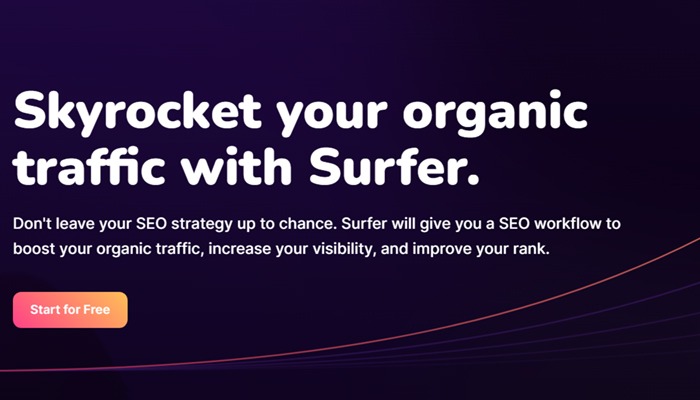
Second on our list of the best AI marketing tools is Surfer SEO which is the ideal platform for you to improve and optimize your written work. It uses artificial intelligence to analyze and optimize the content of web pages and offers valuable insights to help marketers understand what search engines are looking for, which is critical for their work to rank well on search results pages.
Another headache that this AI takes away from its users is the need to invest time in order to improve the SEO of a text, as it already provides specific recommendations to improve the content of the page, such as suggestions and keyword density, length of the text, and article structure.
Benefits
- Competitor Analysis: Surfer SEO offers competitor analysis and performance comparisons to help users understand how they are doing;
- Personalization: AI can provide personalized insights based on user data, allowing platform users to customize their SEO strategy.
Disadvantages
- High cost: The use of AI in Surfer SEO can increase the cost for companies because their plans have a high investment value, starting at US$49 per month;
- Few features: the basic plan of the artificial intelligence platform does not offer many features, which ends up leading the user to choose the intermediate plan of US$99.
3. Phrasee
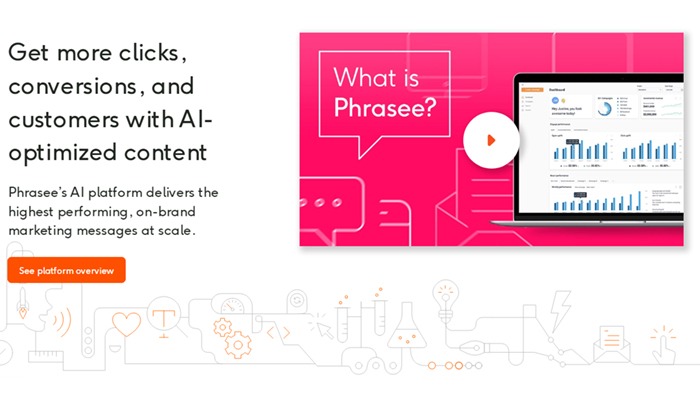
This AI is ideal for the marketer who wants to leverage artificial intelligence to analyze customer sentiment. The platform uses machine learning algorithms to analyze data and generate texts that increase consumer engagement, conversion, and retention rates.
Phrasee uses processed natural language and semantic analysis to understand sentence structure, tone, and emotion to be able to generate relevant and personalized texts. In addition, the platform can offer tests to optimize marketing campaigns in real-time, based on customer responses.
Benefits
- Automated testing: AI can test different text and layout variations in real time, identifying which performs best to optimize your marketing campaign.
- Saving time and resources: using Phrasee can optimize the work of marketing professionals, who do not need to create texts manually or test campaigns manually.
Disadvantages
- Data dependency: Phrasee relies on accurate and up-to-date data to generate copy and optimize marketing campaigns, which can be a challenge if the data is not available;
- Limitations: While AI can be highly effective, it still has some limitations, such as the ability to understand subtle nuances of language and culture.
4. Chatfuel
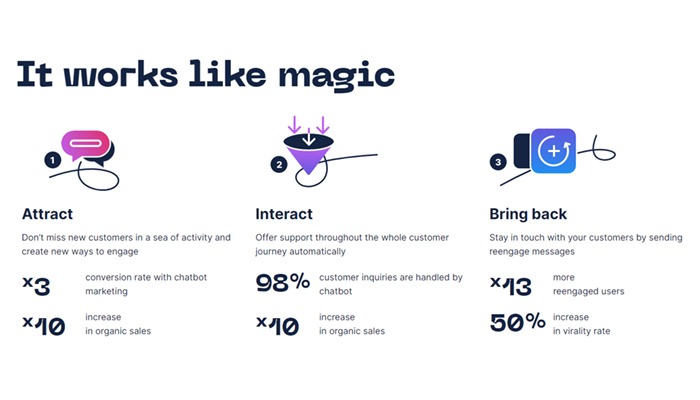
Following our list of the best marketing tools with Artificial Intelligence is Chatfuel, which uses AI to create customized chatbots for companies so that their communication with their customers occurs in an automated and interactive way. All of these can be done by marketers even if they don’t have programming skills.
The AI uses natural language processing technology to understand what users are asking and respond accordingly. In addition, it allows users to create personalized conversation flows, which can be automated to guide the user to a solution or service.
Benefits
- Personalization: with Chatfuel, it is possible to create personalized conversation flows that adapt to the user’s behavior;
- Saving time and resources: Using chatbots can help reduce the workload of human agents and respond to user requests more quickly.
Disadvantages
- Security: the use of the chatbot may involve the collection and use of sensitive customer data, which can be a challenge to ensure the security of this data;
- Limitations: This AI also has limitations in its ability to understand natural language and accurately personalize responses.
5. Deep Art
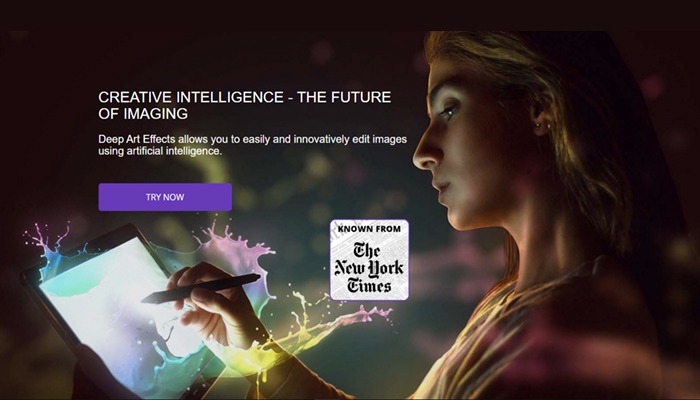
Ideal for marketing professionals who want to create art, Deep Art is an artificial intelligence platform that allows you to transform images into different artistic styles. The platform uses neural network algorithms to analyze the structure and content of an image to apply a specific artistic style to it.
Platform users can upload their own images or choose existing images from Deep Art’s art gallery to apply a style. DeepArt offers a variety of artistic styles, such as famous paintings, cartoons, computer graphics, and modern styles.
Benefits
- Differentiated images: Deep Art allows the creation of unique and artistically interesting images that can be used in different marketing contexts;
- Good User Experience: The AI is relatively easy to use as it has simple and intuitive options.
Disadvantages
- Time: Deepart’s image creation process can be quite time-consuming, especially when using high-resolution images;
- It has flaws: The AI is not suitable for all types of images and may not work well on some depending on the complexity and texture of the reference art.
6. Campaign Monitor

If you’re looking for an email marketing automation and newsletter creation platform, Campaign Monitor is the right AI for you. It allows companies to create personalized email marketing campaigns based on customer demographics, interests, and behaviors.
Artificial intelligence can even help you predict which campaigns will be most effective for different groups of customers. As a result, you can save time and increase the effectiveness of your campaigns.
Benefits
- More assertive emails: The AI can help customize email campaigns, including content, design, and sending time;
- Customer Segmentation: Campaign Monitor can improve customer segmentation, allowing marketers to target customers based on specific characteristics and web browsing behaviors.
Disadvantages
- Little data: The artificial intelligence can be limited by the quality of available data. Therefore, it is important to have access to high-quality data in sufficient quantity to obtain accurate results;
- User Experience: Campaign Monitor can be difficult to understand and configure correctly, which can lead to inaccurate results or ineffective email campaigns.
The evolution of Artificial Intelligence is walking side by side with that of marketing and using its resources can help you to have an excellent performance in the evolution of your work and professional growth.





